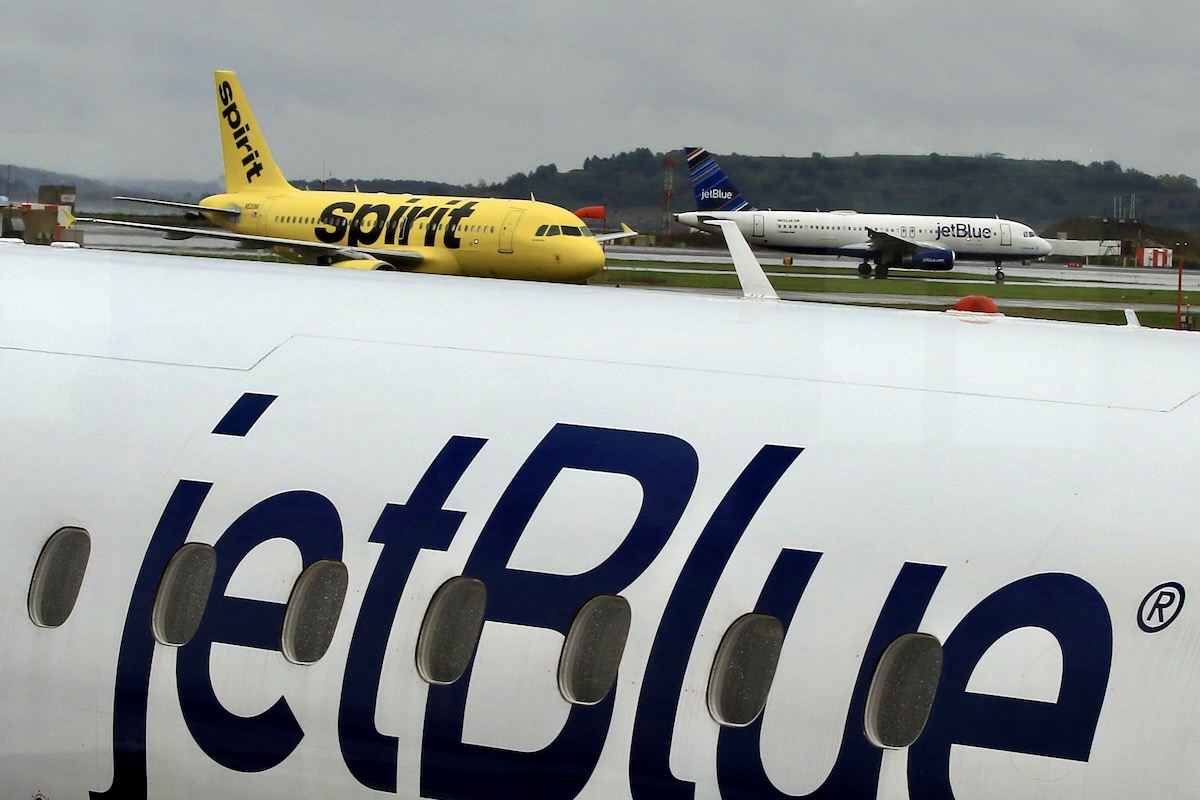The U.S. Department of Justice on Tuesday filed a suit to block the proposed $3.8 billion merger of JetBlue Airways and Spirit Airlines citing competition concerns.
The antitrust regulator claimed that the merger would negatively impact consumers by raising airfares by on average 30 percent, particularly in markets where both JetBlue and Spirit are large. That impact would be felt by at least the 30 million passengers that Spirit carried last year, plus everyone that pays less, thanks to the competitive effect of the discounter’s bargain no-frills fares, the DOJ argued. Massachusetts, New York, and the District of Columbia joined the DOJ in the suit filed in the U.S. District Court for the District of Massachusetts.
“The merger of JetBlue and Spirit would result in higher fares and fewer choices for tens of millions of travelers across the country,” U.S. Attorney General Merrick Garland said Tuesday. The merger would violate the Clayton Act that governs antitrust in the U.S.
The U.S. Department of Transportation said Tuesday that it backs the DOJ’s position, and will deny JetBlue and Spirit’s application for an exemption to close their merger.
JetBlue and Spirit have repeatedly rebutted such claims arguing that, by merging, the airlines would create a stronger competitor to the Big Four airlines — American Airlines, Delta Air Lines, Southwest Airlines, and United Airlines. This would allow them to provide more service to more destinations, including potential flights to Hawaii.
“We believe the DOJ has got it wrong on the law here and misses the point that this merger will create a national low-fare, high-quality competitor,” JetBlue CEO Robin Hayes said in a statement Tuesday. He has previously said the airline would take the DOJ to court if it moved to block the merger.
The deal is not without its supporters. Florida’s Attorney General Ashley Moody on Monday unveiled an agreement with the airlines to support the merger in exchange for commitments to grow and protect jobs in Florida. Under the accord, JetBlue and Spirit would increase the number of seats they fly in both Fort Lauderdale and Orlando — bases for each airline — by 50 percent from current levels, as well as the aggregate number of seats they fly at all other Florida destinations by 50 percent.
“Blocking this merger in an attempt to undo the consolidation in the airline industry is backward thinking,” Association of Flight Attendants-CWA President Sara Nelson said Tuesday. “It will do nothing to change today’s industry dynamics, but it will ensure things stay the same.”
The AFA, which represents flight attendants at Spirit, backs the merger.
The merger of JetBlue and Spirit would create the fifth largest U.S. domestic airline after the so-called Big Four. The combined carrier would have a roughly 8 percent share of the market, based on U.S. Bureau of Transportation Statistics data for the year ending in November. The deal came together after a protracted bidding war between JetBlue and Frontier Airlines last year. Spirit shareholders approved the combination in October.
And, in a nod to any potential antitrust concerns, JetBlue and Spirit have offered to divest the latter’s gates and assets in Boston and New York, as well as five gates at the Fort Lauderdale airport where both have large bases.
That proved not enough for Garland. He described the proffered remedies from the divestitures as “speculative” in nature, and not a guarantee of new competition.
Asked whether the DOJ would approve the merger if JetBlue gave up its controversial alliance with American in the Boston and New York markets, Garland said the merger would “exacerbate the problems caused by that alliance, but even without that alliance it still violates” antitrust.
The DOJ sued to unwind the American-JetBlue alliance in 2021. The parties are awaiting a judge’s decision after arguments ended in November.
In its suit against the proposed merger, the DOJ was able to draw heavily from JetBlue and Spirit’s past public comments about each other. For example, when JetBlue made its hostile bid for Spirit last year, executives at the latter repeatedly argued that airfares would rise if the deal happened. Average ticket prices fall by an average of 17 percent when Spirit enters a market, the regulator said. However, when the airline exits a route airfares rise by on average 30 percent — even when JetBlue continues to fly the route.
The DOJ even questioned JetBlue’s argument that it needed to become bigger to keep the Big Four airlines in check. It noted that, over the past decade, the airline has become more like its larger competitors rather than less. This includes airfares where JetBlue often actively participates in incremental average fare increases led by one of its competitors.
“If JetBlue acquires Spirit, it would have more incentives to coordinate with other airlines on price increases and capacity reductions,” the regulator said in its suit.
A quick decision on the DOJ’s suit is unlikely. A settlement is a possibility, however, negotiations could take months. It took three months for the regulator to reach an agreement to drop its suit against American and US Airways proposed merger in 2013. If a settlement is not reached, the suit could go to court.
JetBlue and Spirit have previously said they aim to close the merger by the first quarter of 2024.
Subscribe to Skift Pro to get unlimited access to stories like these
{{monthly_count}} of {{monthly_limit}} Free Stories Read
Subscribe NowAlready a member? Sign in here
Subscribe to Skift Pro to get unlimited access to stories like these
Your story count resets on {{monthly_reset}}
Already a member? Sign in here
Subscribe to Skift Pro to get unlimited access to stories like these
Already a member? Sign in here
